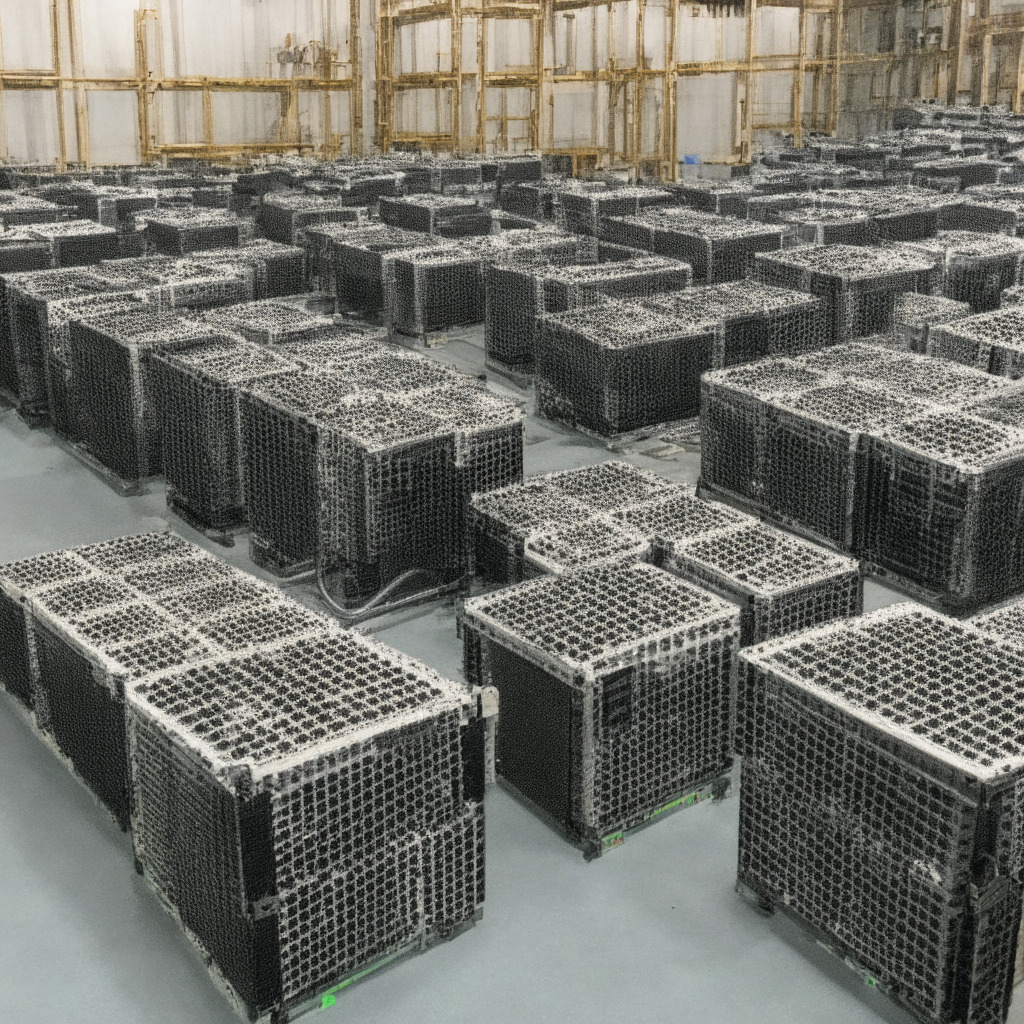This excerpt spotlights a less-known aspect of bitcoin mining: its tendency to exploit the cheapest available electricity, regardless of location. It also notes how bitcoin can incentivize cleaner, more efficient energy practices through waste mitigation and electrification of heating, potentially creating a future of environmentally friendly energy consumption.
Search Results for: Bitcoin-mining
Harnessing the Duck Curve: The Rise of Bitcoin Mining in Texas and its Implications
“In their strategy to attract Bitcoin miners, Texas utilizes a unique “duck curve” model illustrating energy supply and demand fluctuations. Texas’s adaptive system allows the price of energy to “float” throughout the day, creating a favourable environment for Bitcoin miners with an abundance of cheap renewable energy. However, regulatory and environmental concerns pose a challenge.”
Green Blockchain: Shaping Bitcoin Mining Towards Greater Sustainability and Fewer Emissions
“Bitcoin mining, criticized for high power consumption, might be becoming environmentally sustainable. Initiatives include utilizing hydro-cooling mining farms, small hydropower plants, and prevention of gas flaring in oil drilling. This transition, along with migration to countries offering cheaper renewable energy, could redefine Bitcoin mining’s environmental impact.”
Evertas Acquires Bitsure: A Game Changer for Crypto Mining Insurance Landscape
Evertas, a digital asset insurance entity, has acquired Bitsure, a leading provider of crypto mining insurance. Aiming to broaden coverage across multiple jurisdictions, this move may reshape the crypto mining landscape. The acquisition is speculated to support mining operations and other related exchanges amid market instability.
Blockchain: Revolutionizing Digital Finance or Opening Pandora’s Box?
“Blockchain technology asserts individual control over transactions, minimizes fraud risk, and offers transaction traceability. However, its decentralisation invites concerns over regulation, its robust security is still vulnerable, and its transparency could lead to privacy issues. Its future carries both potential and uncertainty.”
Bitcoin and the Balancing Act: Market Unrest, Mining Pressure and the Value Clash
“The Bitcoin market has seen unrest due to a large transaction by the US government and increasing mining challenges. Amid this, Bitcoin’s price trends show upward potential in the face of varying market pressures. Its future depends on its ability to surpass key resistance levels amid these complex conditions.”
Navigating the Bitcoin Halving Ripple Effect: A Dive into AI Infrastructure and Mining Future
“Hut 8 Mining has ventured into the AI infrastructure space, a sector that has grown from a $95 billion to a $900 billion opportunity in recent years. The company aims to balance traditional data centers and Bitcoin mining centers, despite potential challenges associated with Bitcoin ‘halving’ and dwindling data center inventory.”
U.S Bitcoin Mining Stocks’ Remarkable Comeback: Resilience Amidst Harsh Crypto Winter
Bitcoin mining stocks in the U.S have witnessed a remarkable recovery in 2023, fueled by the strong performance of Bitcoin and institutional exchange-traded-fund (ETF) filings by financial giants. Additionally, resilient miners with minimal costs have profited when Bitcoin prices surpass production costs. However, high-debt miners struggle in this harsh landscape.
UAE Emerges as New Powerhouse in Bitcoin Mining: Opportunities and Challenges
“Bitcoin mining companies are gravitating towards the UAE, now becoming a Middle Eastern hub for crypto mining. Its digital adoption, affordable energy, and crypto-friendly stance have attracted these companies. Currently, it’s home to nearly 4% of the Bitcoin global hashrate.”
Riot Platforms’ Massive ASIC Order: Revolutionizing Bitcoin Mining or Threat to Sustainability?
Riot Platforms acquires 33,280 mining rigs from MicroBT, increasing its hashrate capacity to 20.1 EH/s. The machines, designed for immersion cooling systems, will be deployed by Q1 2024. This groundbreaking development occurs as questions about optimizing efficiency and addressing environmental concerns in the mining industry arise.
Bitcoin Heated Pools and Beyond: Unleashing Crypto Mining’s Creative Potential
Imagine taking a dip in water warmed by bitcoin miners; a unique system uses heat exchangers to transfer the heat produced from ASICs to the water. Cryptocurrency enthusiasts are finding creative ways to incorporate mining into daily life, from heating pools to powering greenhouses and calming noisy infants.
Heating Pools with Bitcoin Mining: Eco-Concerns vs. Innovative Solutions
Brooklyn-based bathhouse, Bathouse, has implemented a small-scale Bitcoin mining operation to heat its swimming pools. Facing mixed reactions, this unique heating solution sparks debates over environmental impact, while showcasing potential innovative applications of blockchain technology.
Brooklyn Bathhouse Heats Pool with Bitcoin Mining: Innovation or Environmental Concern?
A Brooklyn bathhouse uses Bitcoin mining rigs to warm its spa, generating heat as a byproduct which is captured for heating pools. While a potential avenue for sustainable mining, concerns remain over the overall environmental impact of the cryptocurrency industry.
CleanSpark’s $9.3M Expansion: Mining Efficiency vs Uncertain Profitability in Bitcoin Industry
Bitcoin mining firm CleanSpark acquires two mining sites in Georgia for $9.3 million, aiming to achieve a 16 exahash per second (EH/s) hash power target by 2023. The acquisition contributes to a 15% increase in computing power, positioning CleanSpark as an energy-efficient miner. However, long-term profitability amidst market challenges remains uncertain.
Heating Up the Crypto Debate: Bathhouse’s Bitcoin Mining Pool Sparks Controversy
A Brooklyn-based spa, Bathhouse, uses a small-scale Bitcoin mining operation to heat their pools and operates on a “Bitcoin Standard.” This unique heating process generates mixed reactions due to Bitcoin mining’s energy consumption and environmental impact, sparking discussions on cryptocurrency innovation.
Binance Cloud Mining Service: Pros, Cons, and Regulatory Challenges
Binance is launching a subscription-based Bitcoin cloud mining service, allowing users to purchase hashrates without investing in equipment. However, due to SEC allegations, the service is unavailable for US investors, highlighting challenges and regulatory uncertainties faced by cryptocurrency exchanges.
Restoring Trust in Crypto Lending: Tether’s Response to FTX Collapse & Media Skepticism
The FTX exchange collapse has spurred fear and uncertainty in the crypto community. Facing this challenge, Tether, the largest stablecoin issuer, aims to restore consumer faith by ceasing lending from its reserves and emphasizing fully-collateralized loans backed by liquid assets.
US Crypto Mining Tax Proposal: Impacts, Reactions, and the Future of Regulation
The proposed Digital Assets Mining Energy (DAME) tax, which aimed to impose a 10-30% tax on electricity used for crypto mining, failed to make its way into a U.S. debt ceiling bill. The tax’s potential impact on global emissions, renewable energy incentives, and the uncertain regulatory environment stirred debates within the crypto community, highlighting the need for governments to embrace and properly regulate the evolving blockchain future.
New Mining Investments Amidst 44% Decline in Bitcoin Profits: Examining Resolute Companies
Despite a 44% decline in Bitcoin mining profitability over the past year, companies like CleanSpark continue to expand, with CleanSpark recently purchasing 12,500 Antminer S19 XP units for $40.5 million. As mining difficulty reaches an all-time high, the industry demonstrates resilience and optimism, aiming for greater efficiency and productivity.
Binance CEO on Lightning Network, Mining, and Global Crypto Regulations
Binance CEO Changpeng “CZ” Zhao discusses the importance of Lightning Network integration for crypto exchanges, mining operations, regulatory challenges, and the need for investors to research before investing in meme coins, NFTs, or metaverse projects. Favorable crypto regulations cited in UAE and Hong Kong.
Bitcoin Mining Difficulty Soars: Impact of Ordinals Protocol and Upcoming Halving Dilemma
Bitcoin mining difficulty is set to reach a new record high of 50.91 trillion, reflecting the growing number of mining machines. This surge occurs alongside the Bitcoin network’s hashrate rally and increased network fees, resulting in boosted profitability for miners. With the Ordinals protocol enabling NFTs and BRC-20 tokens on the Bitcoin blockchain, demand for block space increases, maintaining high network fees and incentivizing more miners to join.
Tether Leverages Uruguay’s Renewable Energy for Bitcoin Mining: Eco-Friendly Progress or Not Enough?
Tether expands into Bitcoin mining in Uruguay, leveraging the country’s 94% renewable energy sources. While reducing ecological footprint, it also raises environmental concerns and emphasizes the importance of balancing innovation with ecological impact.
Tether’s Green Bitcoin Mining Strategy in Uruguay: A Sustainable Future or Just Hype?
Tether plans to launch a Bitcoin mining operation in Uruguay, primarily due to the country’s remarkable renewable energy capabilities. With over 98% of electricity generated from renewables, Tether aims to minimize its ecological footprint while maintaining Bitcoin network security and integrity.
Sustainable Bitcoin Mining: Tether’s Move to Uruguay and its Impact on Environment & Economy
Tether, the largest stablecoin company, plans to mine Bitcoin in Uruguay using renewable energy for a minimal ecological footprint. The move aims to diversify and strengthen the company’s stablecoin reserves, while addressing concerns about the environmental impact of crypto mining and highlighting potential economic benefits for local communities, particularly in rural areas.
Tether’s Leap into Sustainable Bitcoin Mining: Boon or Smokescreen?
Tether has invested in a sustainable Bitcoin mining facility in Uruguay, aiming to promote responsible and eco-friendly mining practices. However, the company must also address transparency and security concerns to maintain trust in the stablecoin market.
Bitcoin Mining Difficulty Nears 50T: The Impact on Miners and Blockchain Growth
Bitcoin mining difficulty is set to surpass a record 50T, driven by factors like the Bitcoin price rally and the surge in popularity of the Ordinals protocol. Increasing difficulty levels impact miner profitability but also stimulate growth within the network, with transaction fees tripling, benefiting miners’ revenue.
Tether Energy: Advancing Bitcoin with Sustainable Mining in Uruguay – Pros and Cons
Tether announces its dedication to advancing Bitcoin by investing in renewable energy production and sustainable Bitcoin mining in Uruguay through a new venture called Tether Energy, promoting eco-friendly practices within the cryptocurrency industry.
Debt Ceiling Agreement Blocks Crypto Mining Tax: A Win for the Industry or Environmental Setback?
The recent U.S. debt ceiling agreement has notably blocked the proposed Digital Asset Mining Energy (DAME) excise tax, preventing a 30% tax imposition on cryptocurrency mining firms. This outcome, seen as a victory for the crypto industry, has sparked debates around the environmental impact of crypto mining operations and the importance of addressing energy consumption concerns for a sustainable future.
Polarization of Crypto Debate: Finding Common Ground for Progress and Innovation
The crypto debate in the U.S. has become polarized and politicized, hindering technical discussions on policy and technology. Social media fuels the issue, promoting fear-mongering and limiting productive conversations. A constructive, open-minded approach to discussions is essential for progress and understanding the potential of cryptocurrencies.
USBTC Joins Crypto Mining Giants: Rapid Expansion Strategy’s Pros, Cons, and Challenges
U.S. Bitcoin Corp. (USBTC) joins mining giants after acquiring assets from bankrupt lender Celsius, raising its computing power to 12.2 EH/s. This deal includes 121,800 mining machines, adding to USBTC’s existing 270,000 rigs. However, rapid expansion raises concerns of high energy consumption and environmental impact.
Bitcoin Mining: Savior or Strain on Texas Power Grid? Pros, Cons & the Ongoing Debate
A recent paper suggests that Bitcoin mining loads can help mitigate power shortages in Texas if managed correctly. The state faces concerns about the grid’s ability to handle mining activities. Financial incentives and location strategies can enhance grid-supporting capabilities and alleviate reliability concerns, while legislation and collaboration are needed for sustainable solutions.
Greenidge Generation: Surprising Local Support for Bitcoin Mining Facility
Greenidge Generation, a Bitcoin mining facility in New York, has won local support despite initial concerns about its environmental impact. Accurate information and engaging with local communities are key in shaping policy and perception of mining operations.































